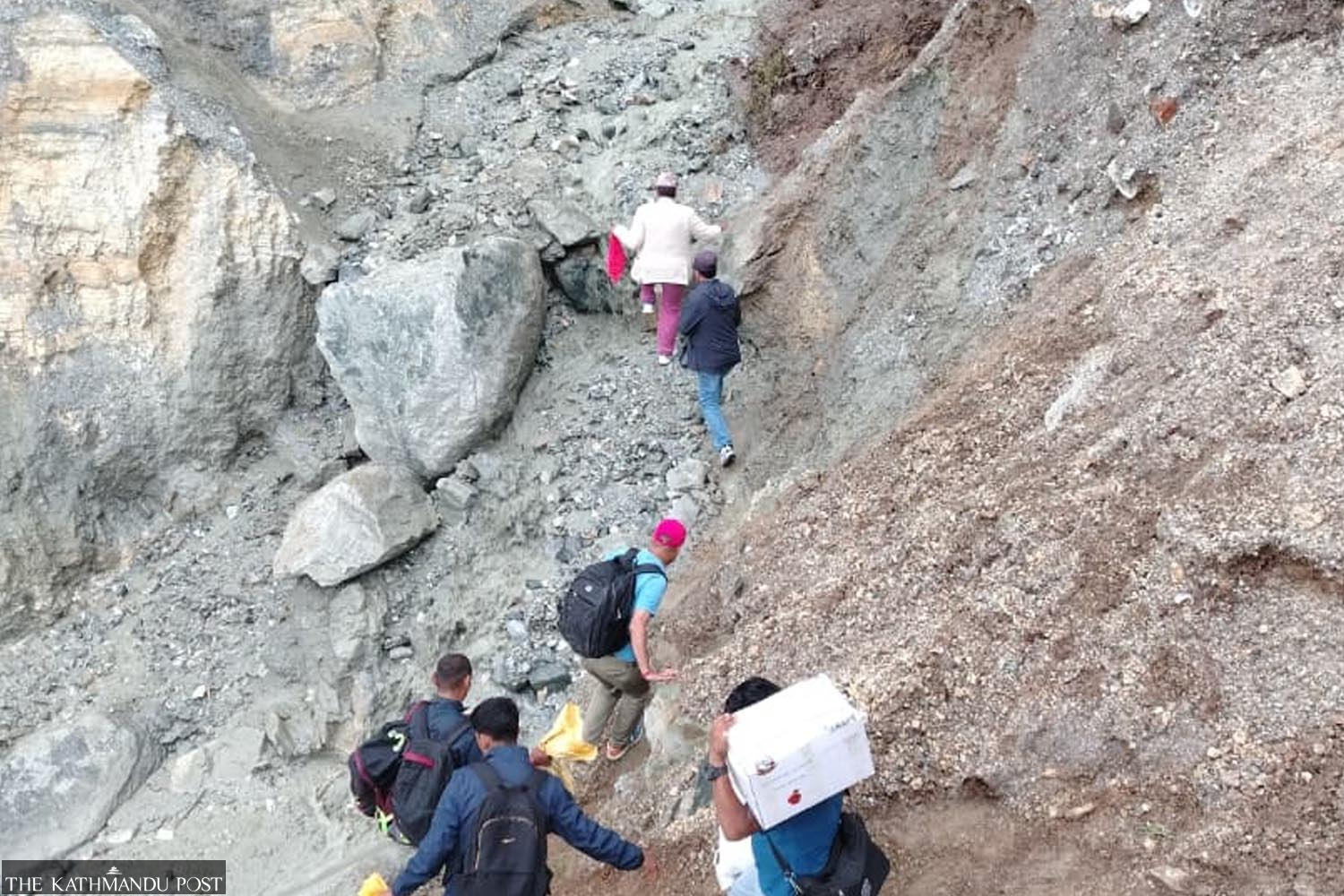National
Martadi-Kolti road in limbo, six vehicle changes needed for 42-km stretch
Jeep operators charge high fares on the damaged road, adding to villagers’ hardship, especially during Dashain.
Arjun Shah
A journey of just 42 kilometres between Martadi, the district headquarters of Bajura, and Kolti in the northeast takes an entire day. What should have been a straightforward ride has turned into an ordeal where passengers are forced to change vehicles at least six times, walking across landslides, crossing rivers on makeshift bridges, and paying fare up to Rs2,000 for a one-way trip.
The road, riddled with landslides and incomplete sections, means no vehicle can make the full journey from Martadi to Kolti. Passengers first take a vehicle from Martadi to Bahuli Khola, then walk to Anai Khola to board another vehicle. From there, they ride to Jilli, switch again at Rajatoli after walking across a landslide, take another jeep to Bhasupatal, then yet another to Dansanghu. After crossing a suspension bridge over the Baddigad stream, they finally manage to reach Kolti on a sixth vehicle.
“To cover 42 kilometres in our own district, we have to spend a whole day and change six jeeps. It’s not a road, it’s a punishment,” lamented Dambar Bohara, a local farmer. He vented his ire stating that the authorities concerned ignored the hardships of the people.
Jeep operators, taking advantage of the road’s condition, charge steep fares. “From Anai Khola to Dansanghu, we charge Rs1,000. The jeeps running from Martadi to Bahuli and Dansanghu to Kolti charge an additional Rs500 each,” said Manoj Bohara, an employee of Martadi-based ticket counter. The cost burden falls heaviest on villagers, who already struggle with low incomes.
The situation has worsened ahead of Dashain and Tihar—two major Hindu festivals that fall in September-October this year—when the number of travelers increases sharply. Residents of Humla, Mugu and Kalikot districts of Karnali province also rely on the Martadi-Kolti road for travel, which means the broken route affects far more than just Bajura.
Bajura, ranked at the bottom of the Human Development Index, has long suffered poor connectivity. “If you cannot even take patients to the hospital in an ambulance because the road is broken, what development are we talking about?” said Amar Bahadur Khadka, mayor of Badimalika Municipality.
The deterioration of the road reflects the widespread malaise of Nepal’s infrastructure projects—delays, negligence, and a lack of accountability. The construction contract for upgrading the Martadi-Kolti-Piluchaur section was awarded to Baniya-Kusheshwar JV, a company linked to Indra Baniya, a Nepali Congress leader who is now the chief minister of Bagmati Province. Despite securing contracts worth over Rs622 million across different packages, the company has repeatedly missed deadlines.

The Sanfebagar-based Infrastructure Development Office said the contractor has been granted extensions four times but has failed to deliver. “We signed the contract in 2019, but even after repeated deadline extensions, the work remains incomplete. Letters have been sent dozens of times, but nothing happens. The only thing that gets extended is the deadline,” said Engineer Devi Upadhyaya at the office.
One package from Chuthi to Dhamkane, a five-kilometre stretch, was supposed to be completed by mid-2021. Another package covering 26 kilometres from Dhamkane to Kolti was to be finished by mid-2023. Both remain incomplete. The company has again secured a fresh extension until July, 2027. Company representative Rishiraj Baniya, who oversees the project, declined to comment on the repeated delays.
Frustration among locals is mounting. Janak Kumar Bohara, mayor of Budhinanda Municipality, said, “Another contractor, working on the first 9 kilometres up to Chuthi, completed the work within the deadline. That proves it’s possible when there is willpower. But here, it is deliberate negligence. We’ve been left stranded.”
Road projects across the country are often awarded to politically connected contractors, many of whom abandon work midway, leaving locals suffering. The Martadi-Kolti road has become a glaring example of this systemic failure.
For residents, the consequences go beyond inconvenience. The northeast of Bajura and adjoining districts depend on this road for access to hospitals, schools, and markets. When landslides block the road, patients cannot be transported to Martadi for treatment. “This is not just about transport. It is about life and death for us. If someone falls seriously ill, they may not survive the journey,” said a local of Kolti.
Officials say they will attempt to repair sections before Dashain to at least allow jeeps to pass. “We are planning to clear small landslides and carry out maintenance so that travel can resume during the festival season,” said engineer Upadhyaya. But locals doubt the promises.
Until accountability is enforced and contractors are compelled to deliver, the Martadi-Kolti road will remain a symbol of neglect, leaving thousands of villagers stranded in their own homeland.
Bajura ranks high among districts with high food insecurity in Sudurpaschim Province. Poor road connectivity further worsens food shortages in the district, resulting in skyrocketed prices of essential commodities.



 10.12°C Kathmandu
10.12°C Kathmandu














